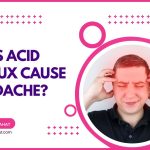4 possible causes of sudden heartburn every day.
Our content is not intended nor recommended as a substitute for medical advice by your doctor. Use for informational purposes only.
Sudden onset of heartburn in patients without prior be due to new-onset gastroesophageal reflux (acid reflux), medications (pill esophagitis), functional heartburn, and others.
Today, we will explain the details and possible sudden onset and persistent heartburn mechanisms.
1 . GERD (gastroesophageal reflux disease or chronic acid reflux).
GERD (gastroesophageal reflux disease) or acid reflux is the most common cause of heartburn. Up to 20% of people worldwide have acid reflux (GERD).
In this disease, your stomach acid may regurgitate back into the esophagus (found inside your chest).
Usually, your stomach lining is thick and covered by a protective mucous layer that protects it from acid.
On the other hand, your esophagus doesn’t have these protective mechanisms. So, sudden heartburn will develop when the acid refluxate into it.
Can GERD start to cause heartburn every day all of a sudden?
The first onset of GERD can be all of a sudden, causing heartburn every day. The sudden onset is often related to an event such as eating a heavy meal, snaking at bedtime, or the first attack of a hiatal hernia.
Symptoms (How to know it is GERD):
- Heartburn (burning sensation in the middle of the chest) can start suddenly.
- The heartburn often starts after meals or at night.
- The frequency of heartburn determines the severity of GERD. GERD is considered severe when heartburn occurs every day for weeks or months.
- Regurgitation of bitter fluid or food particles into your larynx or mouth.
- Regurgitation and heartburn may lead to choking and coughing at night.
- Difficulty swallowing food.
- Nausea and vomiting.
- Anorexia (loss of appetite).
- Increased salivation (water brash).
- Globus sensation in the throat.
What causes GERD?
- Abnormal function of the sphincter between your stomach and esophagus (the gastroesophageal sphincter).
- Hiatal hernia (a herniation of a part of your stomach into the chest through the diaphragm.
- Obesity.
- Smoking.
- Pregnancy.
- Foods (alcohol, carbonated foods, fatty or fried foods, coffee, citrus fruits, tomatoes, spicy foods, etc.).
- Bad eating habits such as overeating or eating just before bed.
- Take medications such as aspirin, ibuprofen, and some muscle relaxants.
Treatment of GERD-related heartburn?
The first step in treatment is to confirm the diagnosis by visiting your doctor. The cornerstones of GERD treatments are:
- Proton pump inhibitors (drugs that reduce stomach acid) are often prescribed for at least 6 to 8 weeks.
- Antacids (such as aluminum hydroxide) and H2 blockers (such as famotidine) may also help.
- Avoid reflux-inducing foods such as high-fat diets, caffeine, spicy foods, etc.
- Head elevation during sleep.
- Avoid sleeping directly after eating.
Causes of sudden heartburn every day in patients with GERD:
- Poor compliance with medications.
- Inappropriate dose or type of medication.
- Bad timing of PPIs (PPI should be taken on an empty stomach at least 30 minutes before eating).
- Presence of a pocked of acid inside the esophagus (residual acid reflux).
- Non-acid reflux (such as bile reflux).
- Hypersensitive esophagus.
- Functional heartburn (explained later).
- Alternative diagnoses (see later).
2. Medications.
One of the most common causes of sudden heartburn that persists for days is the use of certain drugs.
Drugs can cause heartburn by either (reference):
- Inducing (triggering) acid reflux, or
- Causing direct irritation to the esophagus (pill esophagitis).
Review any recent intake of medication before the sudden onset of persistent heartburn.
A. Drugs that trigger acid reflux.
- Anticholinergic drugs (used for overactive bladder and irritable bowel syndrome).
- Sedatives such as diazepam, temazepam.
- Theophylline (used for bronchial asthma).
- Some antihypertensive and heart medications include calcium channel blockers (amlodipine), ACE inhibitors, and nitrates.
- Antidepressants such as amitryptiline, doxepin, etc.
- Opioid analgesics.
- Progesterone.
B. Drugs that irritate the esophageal lining:
- Antibiotics: such as clindamycin and tetracycline.
- NSAIDs suchas aspirin and ibuprofen.
- Quinidine.
- Iron supplements.
- Bisphosphonates.
- Potassium supplements.
Taking one of these drugs can cause sudden, persistent heartburn for days.
Drug-induced heartburn often resolves shortly after you stop the offending drug. However, some drugs may cause significant damage to the esophagus (severe pill esophagitis). So, call your doctor if the pain is significantly severe.
3. Functional heartburn (often due to stress & anxiety).
Functional heartburn is a well-recognized functional gastrointestinal disease. Patients may complain of persistent heartburn and symptoms typical for GERD without response to PPI treatment.
The exact cause of functional heartburn is still not fully understood. Some theories exist:
- Oversensitive esophagus to chemicals and minimal amounts of acid that don’t cause symptoms in ordinary people.
- Psychological diseases or conditions such as anxiety, depression, stress, etc.
For example, This review study found that depression, abuse, and anxiety patients are more common than those with Gerd-like symptoms.
How is functional heartburn diagnosed?
Functional heartburn is diagnosed after the exclusion of true GERD. According to ROME IV criteria for functional GI diseases, the diagnosis of functional heartburn is made by:
- Persistent heartburn in the chest for at least three months (once or several days a week).
- No response to optimal acid-reducing therapy.
- No evidence of GERD (by endoscopy) or eosinophilic esophagitis.
- Absence of other esophageal diseases such as achalasia, diffuse esophageal spasm, esophageal cancer, etc.
4. Less common esophageal diseases.
A. Eosinophilic esophagitis.
Eosinophilic esophagitis is a rare chronic disease of the esophagus. Doctors think it is a form of allergic inflammation (immune-mediated) esophageal wall inflammation that may lead to persistent heartburn.
However, eosinophilic esophagitis doesn’t start all of a sudden; Heartburn from eosinophilic esophagitis is often chronic or recurrent and refractory to treatment.
Learn more about the condition.
B. Infections of the esophagus.
Infections of the esophagus are rare. They mainly affect people with poor immunity or debilitating disease. A healthy person is unlikely to have an esophageal infection.
The commonest type of infection of esophageal infection is a fungal infection (candida). However, bacteria and viruses can also cause esophagitis.
Infections of the esophagus can cause sudden onset of heartburn every day. Infections are often diagnosed based on patients’ risk factors and by their endoscopy picture.
C. Achalasia.
Achalasia is a condition in which the lower esophagus muscles fail to relax. It is a rare cause of sudden heartburn.
The main symptom of achalasia is difficulty swallowing foods or drinks.
However, persistent heartburn can also be a symptom. Other symptoms include regurgitation of foods or saliva, bleaching, chest pain, night cough, vomiting, and weight loss.
The sudden onset of persistent heartburn daily without other symptoms is unlikely to be achalasia.
D. Oesophageal cancer.
Cancers of the esophagus can be a cause of persistent heartburn. However, it is a relatively rare disease.
Patients with esophageal cancer often have a long history of difficulty swallowing, chest pain, weight loss, etc.
E. Others.
Other rare causes of esophageal diseases that may cause persistent heartburn every day include:
- Rumination syndrome.
- Bile reflux.
- Mediastinal tumors.
- Esophageal ulcers.
- Esophageal operations.
- Caustic ingestion.
- Evidence-based
- Written by a doctor.






